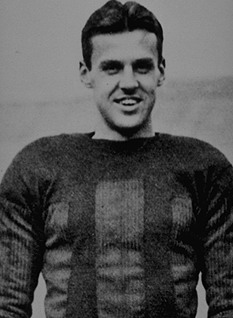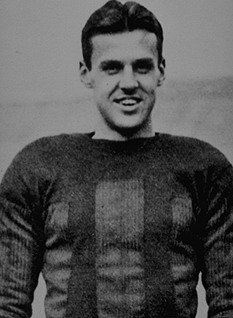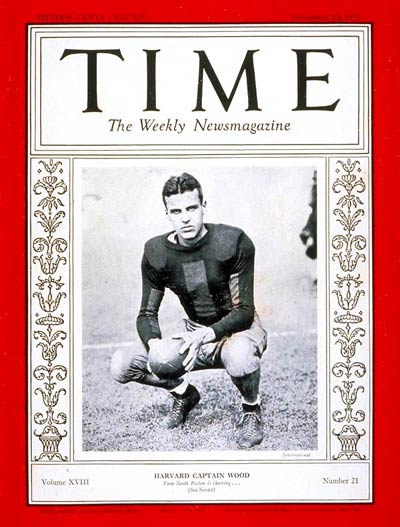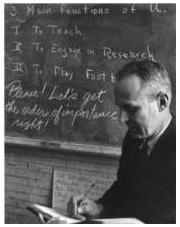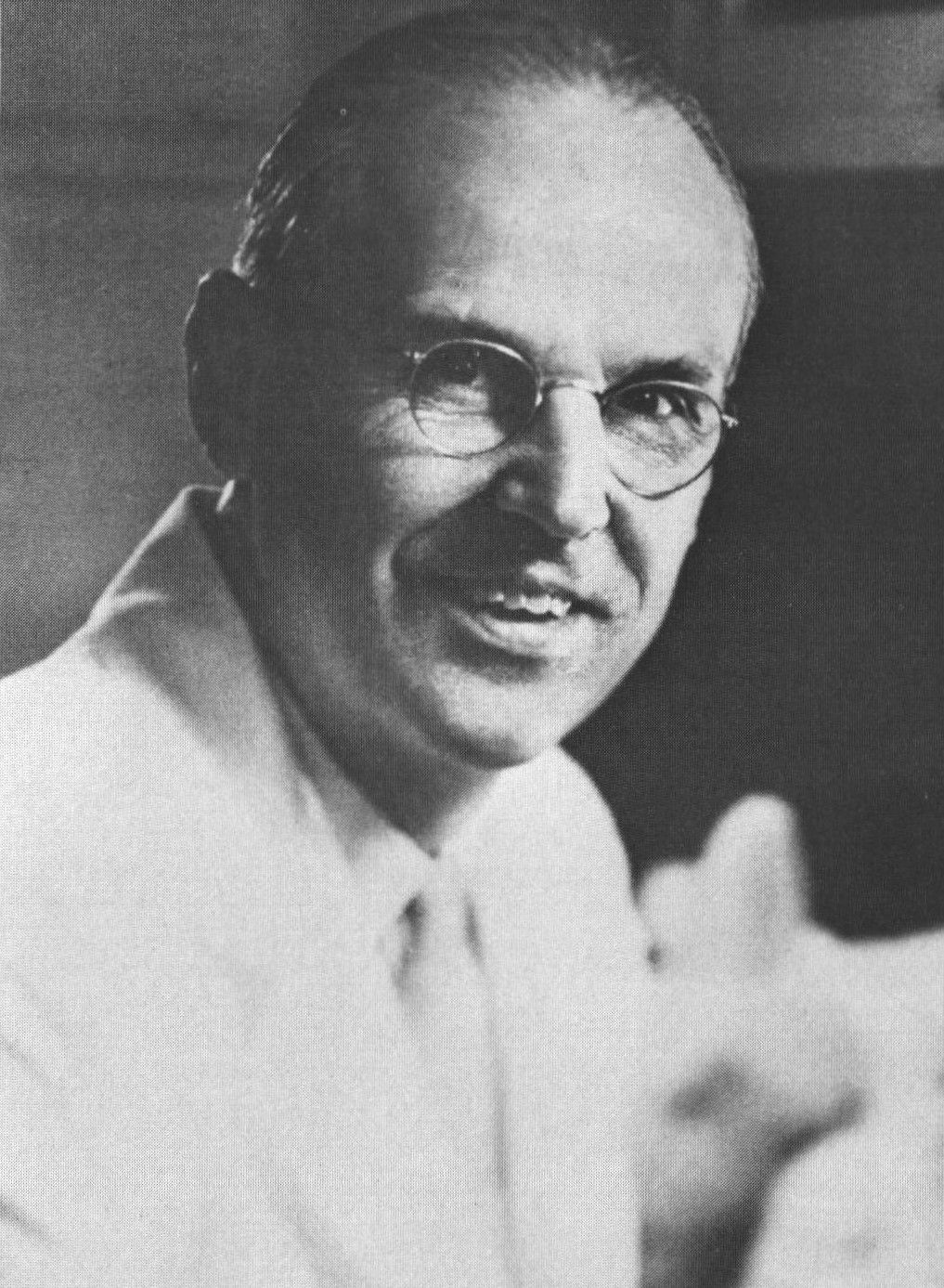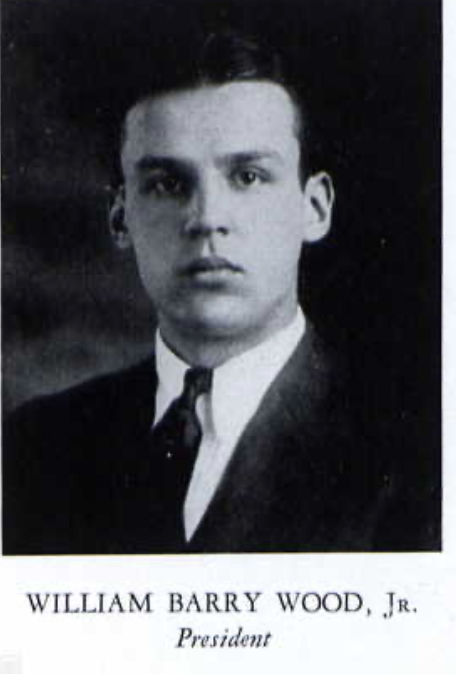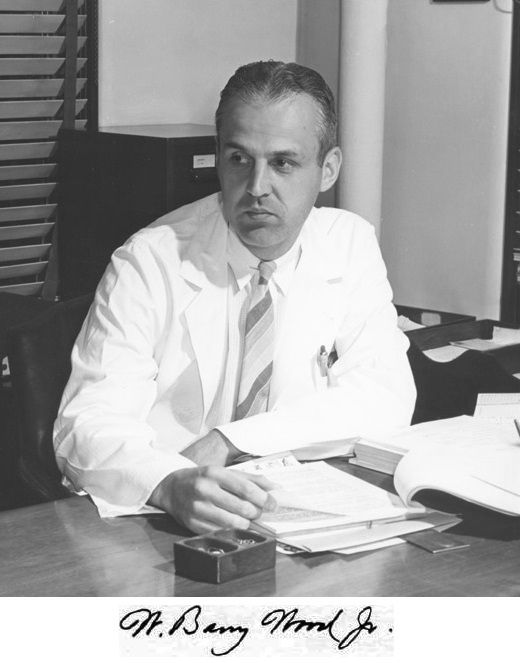He attended Milton Academy and the Thatcher School in California. Harvard Class of 1932.
His main rival on the baseball diamond and football gridiron, was Yale's Albie Booth. Captain Wood appeared on the cover of Time magazine in 1931. He wrote a book titled, What Price Football, published in 1932.
He married on July 2, 1932 in East Edgecomb, Maine, the ceremony officiated by Reverend Leslie Glenn, rector of Christ Episcopal Church in Cambridge.
He turned down an offer to play in an exhibition game of football in the 1932 Summer Olympics held in Los Angeles, California. A Rhodes Scholar at Oxford's Merton College. He was a professor of medicine at Washington University in St. Louis, Missouri and then a professor of microbiology at Johns Hopkins University (JHU) in Baltimore, Maryland. His main areas of study concerned pneumococcal disease, pathogenesis of fever, leukocytic pyrogen, and surface phagocysis. Over one hundred papers related to his scientific observations, in which he either authored or co-authored, were published in The Journal of Experimental Medicine. In 1943, along with several other physicians, he published one of the first papers describing the new drug - penicillin.
At the administrative level, he had served as dean at Washington University and as vice president of the JHU and the Hopkins Hospital.
He was inducted into the College Football Hall of Fame in 1980.
"Well, the only thing I'd like to say at the end is that it has all been wonderful fun. I wouldn't change one thing; it has been a tremendous privilege. And I hope that in the next generation, where things are going to be more complicated, that it will still be possible for people to have as much fun and reward as I had." - Dr. William Barry Wood, in an informal videotaped documentary interview with Dr. Robert J. Glaser in January, 1971. It was part of the Leaders in American Medicine series that was produced by the medical honor society, Alpha Omega Alpha.
He died from a heart attack on March 9th, 1971 during his visit to Boston, Massachusetts. In April a memorial was held for him in Baltimore. He had been scheduled to receive in May the Kober Award, the highest honor of the American Academy of Physicians, and ended up receiving the award posthumously.
Several of Dr. Wood’s medical papers are part of the W. Barry Wood, Jr. Collection at the Alan Mason Chesney Medical Archives of The Johns Hopkins Medical Institutions in Baltimore.
The Wood Basic Science Building at JHU is named in his honor. The W. Barry Wood Jr. Research Award, a student award at JHU, recognizes present commitment and future promise in research. The W. Barry Wood, Jr. Award for Excellence in Teaching, a teaching award at JHU, is awarded annually to the teachers voted by the students in the preclinical years to have been most inspirational and/or effective.
He attended Milton Academy and the Thatcher School in California. Harvard Class of 1932.
His main rival on the baseball diamond and football gridiron, was Yale's Albie Booth. Captain Wood appeared on the cover of Time magazine in 1931. He wrote a book titled, What Price Football, published in 1932.
He married on July 2, 1932 in East Edgecomb, Maine, the ceremony officiated by Reverend Leslie Glenn, rector of Christ Episcopal Church in Cambridge.
He turned down an offer to play in an exhibition game of football in the 1932 Summer Olympics held in Los Angeles, California. A Rhodes Scholar at Oxford's Merton College. He was a professor of medicine at Washington University in St. Louis, Missouri and then a professor of microbiology at Johns Hopkins University (JHU) in Baltimore, Maryland. His main areas of study concerned pneumococcal disease, pathogenesis of fever, leukocytic pyrogen, and surface phagocysis. Over one hundred papers related to his scientific observations, in which he either authored or co-authored, were published in The Journal of Experimental Medicine. In 1943, along with several other physicians, he published one of the first papers describing the new drug - penicillin.
At the administrative level, he had served as dean at Washington University and as vice president of the JHU and the Hopkins Hospital.
He was inducted into the College Football Hall of Fame in 1980.
"Well, the only thing I'd like to say at the end is that it has all been wonderful fun. I wouldn't change one thing; it has been a tremendous privilege. And I hope that in the next generation, where things are going to be more complicated, that it will still be possible for people to have as much fun and reward as I had." - Dr. William Barry Wood, in an informal videotaped documentary interview with Dr. Robert J. Glaser in January, 1971. It was part of the Leaders in American Medicine series that was produced by the medical honor society, Alpha Omega Alpha.
He died from a heart attack on March 9th, 1971 during his visit to Boston, Massachusetts. In April a memorial was held for him in Baltimore. He had been scheduled to receive in May the Kober Award, the highest honor of the American Academy of Physicians, and ended up receiving the award posthumously.
Several of Dr. Wood’s medical papers are part of the W. Barry Wood, Jr. Collection at the Alan Mason Chesney Medical Archives of The Johns Hopkins Medical Institutions in Baltimore.
The Wood Basic Science Building at JHU is named in his honor. The W. Barry Wood Jr. Research Award, a student award at JHU, recognizes present commitment and future promise in research. The W. Barry Wood, Jr. Award for Excellence in Teaching, a teaching award at JHU, is awarded annually to the teachers voted by the students in the preclinical years to have been most inspirational and/or effective.
Family Members
Sponsored by Ancestry
Advertisement
Advertisement
